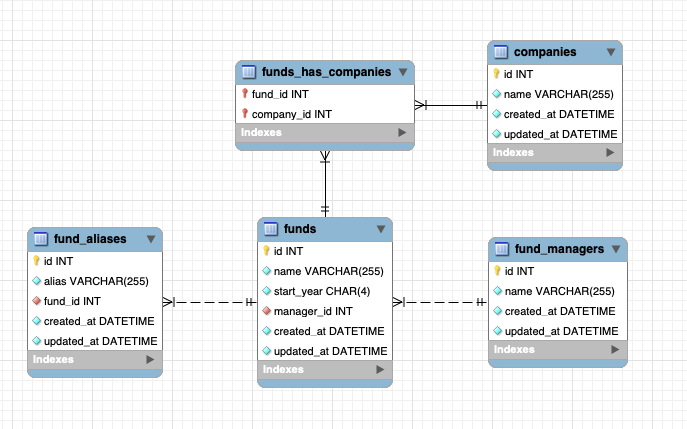It's need to install in your computer:
Docker: 24.0.0+
Execute this commands to start the application:
// Create the .env file
cp .env.example .env
// Start all containers docker
make up
// Enter in container
make bash
// Generate the key
php artisan key:generate
// It's everything!
// You can access the api in: http://localhost:8040/- MySQL 8.0
- Redis 6.2
// Create migrations (First time)
php artisan migrate --seed
// Drop/Create migrations with seeds
php artisan migrate:fresh --seed
// Install database without datas
php artisan migrate:freshThere is a postman collection in the root of the project called docs/canoe.postman_collection.json
curl --location --request GET 'http://localhost:8040/api/funds'curl --location --request GET 'http://localhost:8040/api/funds?search=name%3ABergstrom%3Bstart_year%3A1987%3Bmanager.name%3AParisian'curl --location --request GET 'http://localhost:8040/api/funds/1'curl --location --request POST 'http://localhost:8040/api/funds' \
--header 'Content-Type: application/json' \
--data '{
"name": "Fund name",
"start_year": "2023",
"manager_id": 1
}'The listener will write a log message in the file storage/logs/laravel-d-m-Y.log when receive a event FundDuplicateWarning from the event dispatcher.
curl --location --request PUT 'http://localhost:8040/api/funds/1' \
--header 'Content-Type: application/json' \
--data '{
"name": "Fund name",
"start_year": "2023",
"manager_id": 1
}'curl --location --request DELETE 'http://localhost:8040/api/funds/1'// Run all tests
make bash
php artisan testWill work fine, but we can improve the performance with the following actions:
- Optimize the database queries with proper indexing
- Use a cache system like Redis to store the data and avoid database queries
- Use a database cluster to distribute the database queries between multiple instances
Will work fine, but we can improve the performance with the following actions:
- We can use a load balancer to distribute the requests between multiple instances
- We can use an APM tool to monitor the application performance and identify bottlenecks
